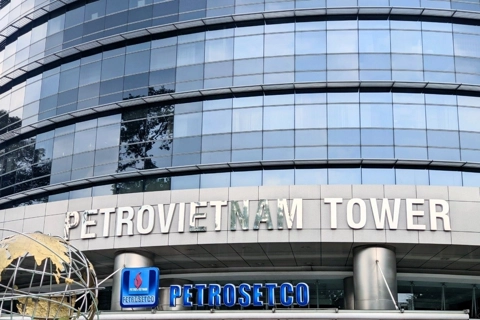Trading scheme – steppingstone to Vietnam’s carbon neutrality: OECD
Experts argued that the carbon market in Vietnam needs the engagement of different stakeholders, the determination of the government, and the support of international partners.
The trading scheme is a great stepping stone for Vietnam to fulfill its net-zero commitments by 2050, with a plan to set up a credit market by 2027, said Antoine Bonnet, an economist at the Organization for Economic Cooperation and Development (OECD)’s Development Center.
| Antoine Bonnet, an economist at the Organization for Economic Cooperation and Development's (OECD) Development Center. Photo: Linh Pham/The Hanoi Times |
The view was shared by Antoine Bonnet, an economist at the Organization for Economic Cooperation and Development's (OECD) Development Center, at an international seminar on “Developing Carbon Market – International Experience and Policy Implications for Vietnam.”
The trading scheme, designed for carbon dioxide (CO2) and other greenhouse gases (GHG), will be formed with international support and lessons learned. Among them is the lesson from the European Union (EU), the world's largest emissions trading scheme in value.
To do that, Vietnam should bear in mind two things, namely administrative capacity and mechanism, Antoine Bonnet told The Hanoi Times.
Specifically, setting up a carbon market requires administrative and data endeavors. It’s about coordinating between ministries to collect the right data. The process requires determination to just go ahead and try. “When you start, there’s a pilot program and the EU made many mistakes initially. They managed to overcome them, try and learn the process,” Antoine Bonnet said.
He stressed the importance of thinking and said it will be a challenge for some businesses but it’s helpful to learn experiences like that from the EU, which is positive because it shows impact, including negative aspects.
The OECD economist highlighted the carbon market, saying that it generates a lot of public revenue and income for the state and is worth leveraging to support businesses. Lessons from the EU showed three mechanisms to do that: innovation, funds, and carbon credit revenues. These things will enable countries to decarbonize faster. In addition, Vietnam should be reminded of social impact funds to facilitate decarbonization.
To help Vietnam develop the carbon market, the OECD, with its technical expertise, data, and best practices gained in different countries like the Netherlands, South Korea, and the US, will inform policymakers in Vietnam of the most effective ways of tackling the issues, Antoine Bonnet shared.
Accordingly, the OECD will publish a paper about Vietnam by the beginning of next year, together with market implementation programs they have been undertaking in multiple countries.
| Julien Guerrier, Head of the EU Delegation to Vietnam, speaks at the seminar held in Hanoi on Nov 23. Photo: Viet Dung |
Carbon market – an important tool for climate joint efforts
Meanwhile, Julien Guerrier, Head of the EU Delegation to Vietnam, said that the carbon market reflects Vietnam’s commitment to carbon neutrality by 2050, the ambitious commitment that the EU has.
“This will be an important tool for us in our joint efforts coping with climate change and to ensure that we achieve our ambitious targets in 2050,” Guerrier spoke at the seminar attended by different stakeholders from Vietnam, regional countries, the EU, and the OECD.
Guerrier said the EU together with G7 and other donors are working to make Vietnam’s climate goals possible. Indeed, the EU invests in banks, supporting intergovernmental mechanisms of the Just Energy Transition Partnership (JETP), a global gateway toward energy transition.
He said different perspectives and innovative solutions from peers and partners in diverse countries enable them to discuss the prerequisites for establishing the carbon market in Vietnam helping the country to at least learn about the opportunities and challenges.
He believed that lessons from the EU and other partner countries are tools to raise revenues, drive innovation, and help deliver broader sustainability and development goals. “We can leave this session with the confidence that these objectives of sharing experience and mapping the path towards carbon marketing would help Vietnam turn plans into initiatives.”
To get things done, Ambassador Julien Guerrier highlighted the role of the private sector in the collective effort, calling it “essential” to realizing climate targets. “The private sector can contribute to designing, finding instruments, methodologies, and trading platforms, driving investment tools toward common reduction projects.”
Apart from the private sector, the Ambassador valued the people's support for the joint and complex commitments coupled with the collective efforts from international stakeholders and countries.
He said the EU, the US, and private and public financial institutions are committed to being partners of Vietnam in this journey. “Vietnam’s journey towards net zero emissions in 2050 will be full of challenges but it’s a journey that we have to embark on, and you should do that collectively for the benefit of Vietnam and the world as a whole.”
| Speakers at the event. Photo: Viet Dung |
The seminar, hosted by Vietnam’s Ministry of Foreign Affairs, highlighted Vietnam’s planned carbon market; Carbon markets: rollout and impacts; Vietnam’s carbon market and the role of international cooperation and partnerships with presentations given by representatives of Vietnam’s Ministry of Natural Resources and Environment; Ministry of Finance; Ministry of Labor, Invalids and Social Affairs; research institutes and associations in Vietnam and from abroad; the World Bank, Citibank; Domestic and foreign business executives and experts.




.jpg)







